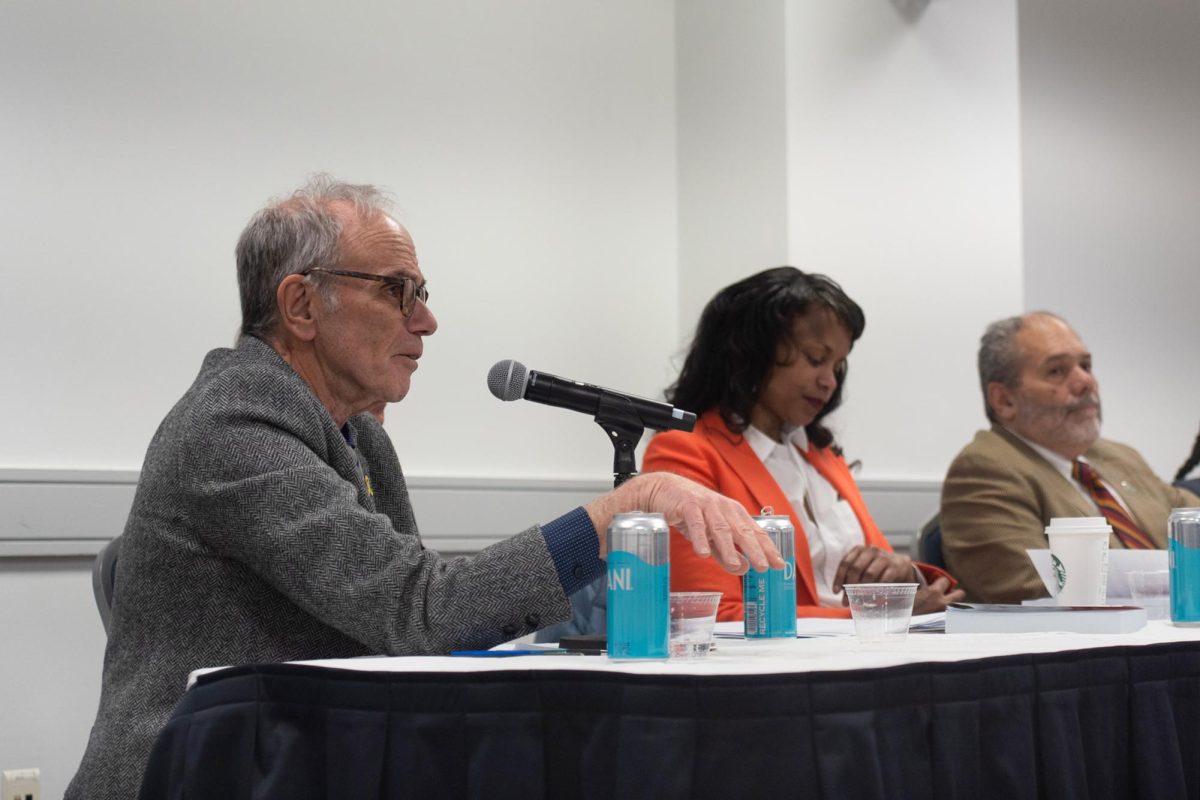A panel of experts discussed the future of education policy and equality Tuesday in the University Student Center.
Education policy experts Alan Curtis and Ray Suarez, Graduate School of Education and Human Development Dean Michael Feuer and Professors Dwayne Wright and Susan Swayze discussed the future of education and equity, reflecting on a never-implemented government report calling for equality in education. GSEHD hosted the event in collaboration with the Milton S. Eisenhower Foundation, a nonprofit organization established to continue the recommendations of the 1968 Kerner Commission report in the modern era.
The commission, formed in 1967 by President Lyndon B. Johnson, deemed that racial unrest throughout American cities was caused by decades of “pervasive discrimination and segregation.” The commission was an extension of Johnson’s “Great Society” policies, which aimed to combat poverty and address racial inequality in the wake of the Civil Rights Movement.
Curtis, president and CEO of the Eisenhower Foundation, said the original Kerner Commission report urged the country to move away from policies that promoted racial inequality and instead make American society more equal, by creating better schools for low-income areas and promoting racial integration nationally.
The panelists discussed the 2024 book “Creating Justice in a Multiracial Democracy,” which Curtis edited and which also includes contributions from Feuer, Wright and Suarez. Curtis said the book is an update to the Kerner Commission, offering economic, education and racial justice policy recommendations for the U.S. today.
“The ‘68 Kerner Commission warned that to legislate, fund and implement what works at a scale equal to the dimensions of the problem, we need new political will in America,” Curtis said. “Sadly, in 2025 we still need new political will.”
Curtis said today there is no national policy for reducing economic inequality, poverty and racial injustice for low-income and working-class Americans. He said much of federal policy today is based on “supposition, denial, misinformation and disinformation” rather than facts, science and evidence.
“Arguably the most urgent moral issue of our time is getting a firm hold on what is true and what is false,” Curtis said. “Truth remains truth. Lies remain lies. Without access to the truth, we cannot really make wise decisions in our public life.”
Suarez, a longtime host and journalist for programs on PBS and NPR, said the Kerner Commission’s report delivered a “scathing” assessment of the media’s portrayal of education policy, accusing it of being “basked in a white world.”
Suarez said the media perpetuated stereotypes that favored suburban schools over city schools regardless of what was actually happening inside them. He said the news industry failed to cover the forces shaping American life at the time, like discriminatory housing practices, which caused some children to have access to the best educational resources while others did not.
Suarez said the news media was never able to adequately cover the educational injustices throughout the country and it now does not have a chance to because it is competing with a “lie industry,” or the rise of online misinformation and echo chambers.
“We’ve always flattered ourselves that we are part of a truth industry,” Suarez said. “Our job, the pillar of our task, is to tell the truth. And there was never a well funded, well staffed, technologically proficient lie industry the way there is now in America in 2025.”
He said the Kerner Commission provided a truthful “snapshot” of the problems with American life by the late 1960s but that its recommendations were not considered because they were too disruptive of stereotypical views of America.
“It was almost like they delivered a bomb, and then we decided to defuse it, because it was just too dangerous to consider what was inside its pages,” Suarez said.
Feuer said the current problem in education policy is that it focuses too much on uplifting the average student rather than reducing deep educational disparities that exist between different student groups. He said academic achievement across all student groups throughout American history has increased generally, despite the “complex and chaotic” educational system that exists.
“By and large there was real progress over many decades largely because there was, with fits and starts, political and national will to fix the glaring imperfections and the glaring anomalies and the glaring unconscionable inequalities that we have been living with,” Feuer said.
Feuer said, in his view, programs like affirmative action in college admissions started as an effort to “come to terms with our past” and promote racial diversity in universities to make up for America’s “historical sins.”
Wright, an assistant professor of higher education administration and diversity, equity and inclusion director at GSEHD, said while the policies he proposes, like continuing racial preference in college admissions, may not be possible under the current presidential administration, some of the most important ideas in history emerged when they had no possibility of being implemented.
“Whoever and however you describe the forces we’re fighting against right now, the one thing I hope they’re never able to take away, and the one thing I hope you never give them the possibility to take away, is your dream,” Wright said.
He said to repair educational equality shortfalls, schools and universities must recognize the “harm that was done,” like the long history of racial segregation in schools, discriminatory admissions practices and underfunding schools in marginalized communities.
“Sometimes when harm is done, whether you’re responsible for it, whether you need to take the blame for it, or whether you can fix it, recognition can go a long way,” Wright said.
He said he did not know whether the current political period is a “bump in the road” or a roadblock, but he added that equality has persevered before and that it will need to persevere again.
“The goal was never DEI, the goal is equitable outcomes,” Wright said. “And whatever they call my office, I am still going to do the work towards equitable outcomes, because those are our values.”










